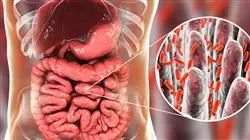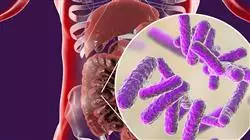University certificate
Scientific endorser

The world's largest faculty of nursing”
Introduction to the Program
In as little as 12 months’ time, you will be aware of the benefits of maintaining an adequate gastrointestinal, oral, urinary tract or reproductive tract microbiota"

Numerous pieces of scientific evidence have implicated the intestinal microbiome and its metabolic potential in various pathological conditions in recent years, giving rise to new therapeutic strategies to control and regulate this ecosystem. The study of this ecosystem is a field that is rapidly advancing scientifically, and it is universally accepted that to achieve an adequate state of health it is also necessary to have a "healthy" Microbiota.
Our Microbiota undergoes changes as a consequence of the influence of multiple factors, diet, lifestyle, pharmacological treatments... generating alterations in this bacterial ecosystem; this abnormal interaction that the organism could have with it is related to certain processes: allergic, acute and chronic intestinal diseases, obesity and metabolic syndrome, neurological diseases, dermatitis and other alterations in the dermis and even some types of cancer.
The increasing availability on the market of new products with very specific strains for very specific problems and diseases makes it necessary for nursing professionals to be up to date with all the scientific advances in this area in order to offer patients more specialized and higher-quality care.
Therefore, from this Professional master’s degree in Human Microbiota for Nursing, the best professionals will focus on offering the latest information to nursing professionals on the importance of flora to maintain a healthy state, and provide them with the most recent studies, which will allow them to expand their knowledge on the benefits and applications of the Human Microbiota for Nursing in their daily clinical practice.
A program without face-to-face classes or fixed schedules, which also gives the professional the freedom to access the syllabus from an electronic device with internet connection and distribute the teaching load according to their needs. Students are therefore faced with a university education that is compatible with the most demanding responsibilities.
The study of the Human Microbiota for Nursing opens a door to the knowledge of multiple diseases, bringing great value to the usual practice of the nurse"
This Professional master’s degree in Human Microbiota for Nursing contains the most complete and up-to-date scientific program on the market. The most important features include:
- Clinical cases presented by experts in Human Microbiota
- Its graphic, schematic and practical contents, with which they are conceived, gather scientific and assistance information on those disciplines that are essential for professional practice
- New diagnostic-therapeutic developments on assessment, diagnosis, and intervention in problems or disorders related to the Microbiota
- Contains practical exercises, where the process of self-assessment can be carried out to improve learning
- An algorithm-based interactive learning system for decision-making in the clinical situations presented throughout the course
- With special emphasis on evidence-based medicine and research methodologies in Human Microbiota
- All of this will be complemented by theoretical lessons, questions to the expert, debate forums on controversial topics, and individual reflection assignments
- Content that is accessible from any fixed or portable device with an Internet connection
Thanks to this Professional master’s degree you will easily delve into studies focused on the microbiota and disorders of the nervous system"
The program’s teaching staff includes professionals from the sector who contribute their work experience to this educational program, as well as renowned specialists from leading societies and prestigious universities.
The multimedia content, developed with the latest educational technology, will provide the professional with situated and contextual learning, i.e., a simulated environment that will provide immersive education programmed to learn in real situations.
This program is designed around Problem-Based Learning, whereby the professional must try to solve the different professional practice situations that arise during the academic year. For this purpose, the student will be assisted by an innovative interactive video system created by renowned and experienced experts.
You will have valuable clinical case studies, so that you can expand your knowledge in a more direct way about the oral, respiratory tract or skin microbiota"

This 100% online educational program is designed so that professionals like you can combine their jobs with a quality education"
Why study at TECH?
TECH is the world’s largest online university. With an impressive catalog of more than 14,000 university programs available in 11 languages, it is positioned as a leader in employability, with a 99% job placement rate. In addition, it relies on an enormous faculty of more than 6,000 professors of the highest international renown.

Study at the world's largest online university and guarantee your professional success. The future starts at TECH”
The world’s best online university according to FORBES
The prestigious Forbes magazine, specialized in business and finance, has highlighted TECH as “the world's best online university” This is what they have recently stated in an article in their digital edition in which they echo the success story of this institution, “thanks to the academic offer it provides, the selection of its teaching staff, and an innovative learning method aimed at educating the professionals of the future”
A revolutionary study method, a cutting-edge faculty and a practical focus: the key to TECH's success.
The most complete study plans on the university scene
TECH offers the most complete study plans on the university scene, with syllabuses that cover fundamental concepts and, at the same time, the main scientific advances in their specific scientific areas. In addition, these programs are continuously being updated to guarantee students the academic vanguard and the most in-demand professional skills. In this way, the university's qualifications provide its graduates with a significant advantage to propel their careers to success.
TECH offers the most comprehensive and intensive study plans on the current university scene.
A world-class teaching staff
TECH's teaching staff is made up of more than 6,000 professors with the highest international recognition. Professors, researchers and top executives of multinational companies, including Isaiah Covington, performance coach of the Boston Celtics; Magda Romanska, principal investigator at Harvard MetaLAB; Ignacio Wistumba, chairman of the department of translational molecular pathology at MD Anderson Cancer Center; and D.W. Pine, creative director of TIME magazine, among others.
Internationally renowned experts, specialized in different branches of Health, Technology, Communication and Business, form part of the TECH faculty.
A unique learning method
TECH is the first university to use Relearning in all its programs. It is the best online learning methodology, accredited with international teaching quality certifications, provided by prestigious educational agencies. In addition, this disruptive educational model is complemented with the “Case Method”, thereby setting up a unique online teaching strategy. Innovative teaching resources are also implemented, including detailed videos, infographics and interactive summaries.
TECH combines Relearning and the Case Method in all its university programs to guarantee excellent theoretical and practical learning, studying whenever and wherever you want.
The world's largest online university
TECH is the world’s largest online university. We are the largest educational institution, with the best and widest online educational catalog, one hundred percent online and covering the vast majority of areas of knowledge. We offer a large selection of our own degrees and accredited online undergraduate and postgraduate degrees. In total, more than 14,000 university degrees, in eleven different languages, make us the largest educational largest in the world.
TECH has the world's most extensive catalog of academic and official programs, available in more than 11 languages.
Google Premier Partner
The American technology giant has awarded TECH the Google Google Premier Partner badge. This award, which is only available to 3% of the world's companies, highlights the efficient, flexible and tailored experience that this university provides to students. The recognition as a Google Premier Partner not only accredits the maximum rigor, performance and investment in TECH's digital infrastructures, but also places this university as one of the world's leading technology companies.
Google has positioned TECH in the top 3% of the world's most important technology companies by awarding it its Google Premier Partner badge.
The official online university of the NBA
TECH is the official online university of the NBA. Thanks to our agreement with the biggest league in basketball, we offer our students exclusive university programs, as well as a wide variety of educational resources focused on the business of the league and other areas of the sports industry. Each program is made up of a uniquely designed syllabus and features exceptional guest hosts: professionals with a distinguished sports background who will offer their expertise on the most relevant topics.
TECH has been selected by the NBA, the world's top basketball league, as its official online university.
The top-rated university by its students
Students have positioned TECH as the world's top-rated university on the main review websites, with a highest rating of 4.9 out of 5, obtained from more than 1,000 reviews. These results consolidate TECH as the benchmark university institution at an international level, reflecting the excellence and positive impact of its educational model.” reflecting the excellence and positive impact of its educational model.”
TECH is the world’s top-rated university by its students.
Leaders in employability
TECH has managed to become the leading university in employability. 99% of its students obtain jobs in the academic field they have studied, within one year of completing any of the university's programs. A similar number achieve immediate career enhancement. All this thanks to a study methodology that bases its effectiveness on the acquisition of practical skills, which are absolutely necessary for professional development.
99% of TECH graduates find a job within a year of completing their studies.
Professional Master's Degree in Human Microbiota in Nursing
The applied study of the microbiome in the improvement of health is a field in constant theoretical and practical growth. Therefore, taking into account that in TECH Global University one of our main objectives is to accompany the processes of professional specialization, we have created this program focused on the composition, classification, functioning and factors that affect the balance-imbalance of microorganisms in the human body. Over the course of the year-long Postgraduate Certificate, students will learn about the physiology and metagenomics of the digestive, respiratory and immune systems (general and cutaneous) and the genitourinary tract, and then delve into the relationship between alterations in the microbiota and intolerances, allergies and infections. Once these bases have been mastered, they will be immersed in recent lines of research, as well as in the clinical applications of probiotic and prebiotic treatments. The thematic path proposed by the Professional Master's Degree enables the nurse in the early recognition of the modification of the bacterial balance and its proper stabilization, in order to ensure the maintenance of a good state of health.
Postgraduate Course in Human Microbiota for Nursing
With this TECH postgraduate course, health professionals will be able to acquire skills in the clinical approach to various diseases through microbiological therapy. From the analysis of microorganisms, it is possible to establish the types of interactions that they maintain with pathologies of digestive or autoimmune nature, which favors the development of complete differential diagnoses, which serve as a basis for an appropriate medical prescription. Our methodology of case analysis and problem-based learning not only facilitates the acquisition of such knowledge, but also allows students to face all types of medical conditions, where they will have to coordinate their skills and mobilize what they have learned. Thus, at the end of the program, students will be able to, at the beginning, develop their skills in daily practice, making sure to provide comprehensive care to their patients through the constant evaluation of potential risks and adverse effects caused by pathologies and treatments. Subsequently, at a later stage, he/she will be able to design and manage strategic prevention campaigns that socialize the causes and consequences of alterations in bacterial ecosystems.







